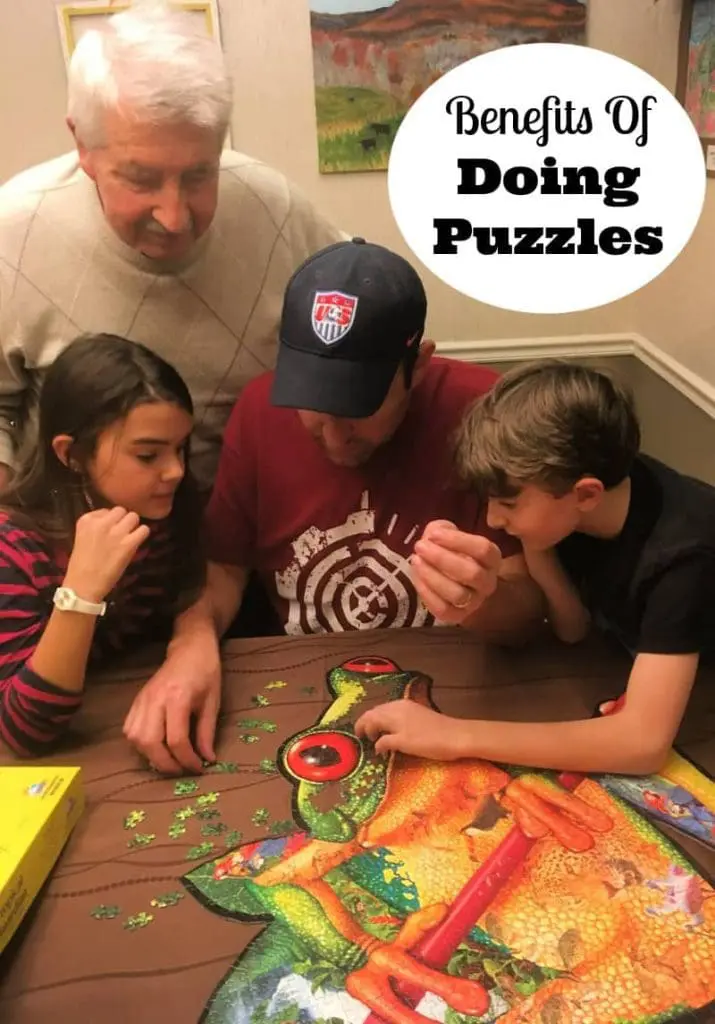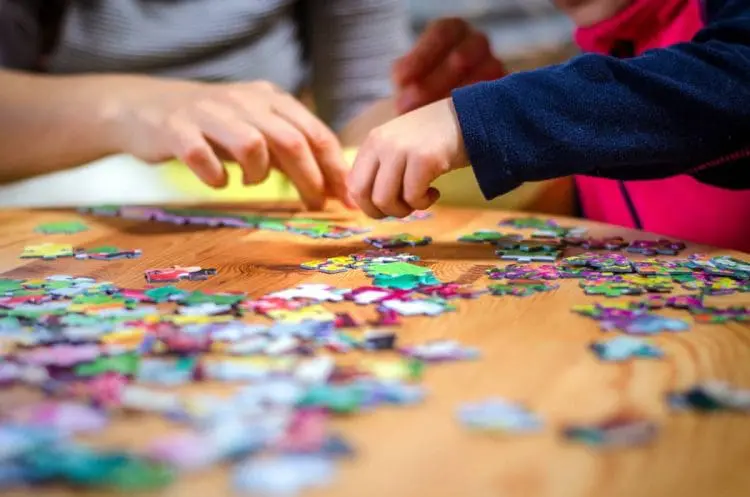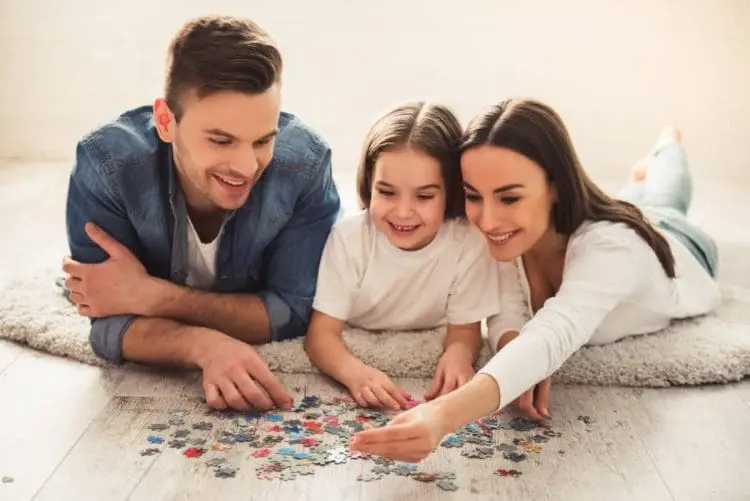Nowadays, both kids and adults are more into their hand-held digital devices. Gone are those days when kids and families bond over board games, card games, comic books, and other traditional modes of entertainment. Now, tablets, laptops, and cellphones can offer immediate entertainment and bring pleasure to the brain anytime, anywhere. However, even with these new and convenient gadgets, kids and adults alike must still give themselves a break from using them. Not only could devices be damaging to their eyes, they tend to reduce real human interaction and bonding. Not to mention that most apps found on these devices are not always healthy or engaging for the brain. Here I will discuss the many benefits of doing puzzles as a fun family activity.

5 Benefits of Puzzles And Jigsaw Puzzle Solving
Jigsaw puzzles are one type of traditional game that still lives to this day and offers numerous benefits. This type of puzzle has existed for many years and is still an object of fun and fascination for kids and families. Best of all, jigsaw puzzles can be played in groups, making them a perfect family bonding activity. So, have you and your family members completed a jigsaw puzzle before? Perhaps you’ve all tried solving one only to end up frustrated and not finish the puzzle.
Solving a jigsaw puzzle with your whole family is more than just a way to pass the time. Here are five ways solving jigsaw puzzles can strengthen family bonds.
Promotes Quality Time
When each of the family members spends time on their phone or laptop, the chance to spend quality time with the family is reduced. Meanwhile, suppose all family members agree to complete a 1,000-piece jigsaw puzzle. In that case, they can come together and spend fun, quality time together. This may take part of a day, or even more, depending on how complicated the puzzle is. Everyone can sit closely together around a puzzle, converse, and share their opinions or ideas. It is a fun activity for people of all ages.
Furthermore, playing jigsaw puzzles is a quiet activity. This gives the family an excellent opportunity to converse and communicate openly without any distractions brought by modern devices. This type of conversation can help family members better understand and connect. This special bonding time can result in a more cohesive, united, and functional family life.
Practice Collective Problem Solving
Families used to solve problems together tend to be more functional and united. One way to exercise your family’s collective problem-solving skills is by playing jigsaw puzzles. As you try to solve the puzzle together, all the family members can put their ideas, strategies, or suggestions on the table to try and solve the puzzle. Each can also hone the different approaches and try to incorporate more details to arrive at a more concrete solution. It is a great mental exercise to develop further cognitive skills.
For instance, suppose the mom suggests identifying the pieces for a specific part of the jigsaw. Then, the youngest daughter suggested another puzzle strategy. She wants to begin solving the puzzle pieces on the side because of their noticeable flat edges. The scenario in the example shows how puzzle-solving has encouraged all family members to come together to solve a particular problem. Eventually, you can apply this to a more relevant situation later on when you and your family will need to resolve disputes or household problems.
Puzzle pieces are a great way to work on visual-spatial reasoning and mental speed. It is a good idea to start with simple puzzles and progress to more challenging puzzles to help increase the attention span. Jigsaw puzzle games are useful for encouraging cognitive function and fine motor skills.

Teaches Family Members About Empathy
Although solving jigsaw puzzles can be fun and tricky, it’s no surprise that the playing family members will also have some disagreements along the way. After all, each may have different ideas or strategies that may clash with another player’s opinion. But if you see or realize that the other person’s strategy was an excellent idea for finishing the puzzle, this will force you to see your family member more empathically. For instance, as a sister, your brother’s strategy effectively made you understand him better.
If you’re playing a jigsaw puzzle, this may sound too much, but teaching family members about empathy usually starts with small steps. Sooner or later, while solving jigsaw puzzles together as a family becomes a routine, you’ll gain different insights about your family each time and develop a greater sense of empathy.
Gives A Sense of Achievement For The Family
It’s not every day that families get to achieve something as a group. So, if you’re looking for an activity you and your family can try to win together, it’s solving jigsaw puzzles. It’s no surprise that some jigsaw puzzles are incredibly challenging. Some would even take days or weeks before they get solved, which means each family member must dedicate their time and effort to completing a puzzle successfully. Once you’ve finally finished one after several days or weeks, there’s no doubt that all of you will feel this tremendous feeling of achievement.
You will eventually be able to enjoy and share the happiness brought to you by this accomplishment, which will provide you with a common ground to further deepen your bond as a family. Additionally, putting together a jigsaw puzzle will offer you a shared experience that you and your family will be able to talk about and remember with happy feelings in the future.
It’s A Fun Group Activity
Jigsaw puzzles can be a fun group activity. Even if it’s a quiet activity, family members playing together can still have fun as you all go through similar experiences of putting puzzle pieces together or getting the wrong one. Unlike if you try to solve it alone, solving jigsaws in groups will allow you to share the fun and the challenge. Additionally, you can also give or receive positive encouragement from other family members. Ultimately, even with a tricky jigsaw puzzle, it can still be a fun experience for everyone.

Conclusion On The Benefits Of Solving Jigsaw Puzzles
As you can see, there is more to jigsaw puzzle-solving than merely finishing the piece. Finding solutions to the puzzles can also help to strengthen the bond that exists between family members. Furthermore, putting together jigsaw puzzles has been linked to a variety of favorable results for players. If you and your family have never attempted to solve a jigsaw puzzle before, now is the time to acquire a difficult puzzle for the whole family to start working on together. You can improve your critical thinking all together, right in your own living room! Can you think of any additional benefits of jigsaw puzzles? What do you enjoy as an effective way to keep your brain active?
Related Post:
Creative Reward Ideas For Kids
Jean Claude Constantin Puzzle Toys For Adults
Words With Friends App: Fun Word Puzzles For Kids That Teach Vocab

Kavita says
Really great information all about parenting. Puzzles are a great family activity.